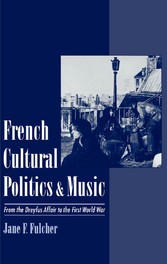
French Cultural Politics and Music : From the Dreyfus Affair to the First World War

von: Jane F. Fulcher
Oxford University Press, 1999
ISBN: 9780195120219
Sprache: Englisch
304 Seiten, Download: 21102 KB
Format: PDF, auch als Online-Lesen
1 THE NEW CULTURAL "WAR" AND THE FRENCH MUSICAL WORLD (p. 15-16)
THE DREYFUS AFFAIR AND FRENCH MUSICIANS
Few historians of France would dispute that the political landscape experienced seismic shifts in the traumatic, tumultuous period during and after the Dreyfus Affair, a new range of political tactics, comportments, practices, and actors made their debut in—to switch to an equally apt metaphor—the new ""theater"" of French politics. Now making their dramatic appearance on the national stage in this seminal period were political leagues and parties, new social groups, and new forms of propaganda.1 It is one particular variety of the latter that demands our special attention here because its impact on the musical world in France was to be direct and profound: born in the wake of the Affair, its nexus was the milieu of those defeated—those who refused to capitulate in the struggle for the principles they had defined in the course of the conflict. With the triumphant Third Republic stolidly in control of political discourse, the cynosure of their propagandistic effort henceforth was culture and, above all, the arts.
In the wake of the Affair, French nationalists turned to culture as an effective but indirect means through which to articulate and subtly insinuate the political values they still hoped to diffuse.2 For the debate over Dreyfus had engaged the central question of French identity, or the fundamental political and moral values for which the nation stood: Did the authority and tradition of the state, the army, that had been defined so emphatically by the French Revolution? With the closure of the Affair, the question of ""What is France?,"" legally at least, was resolved conclusively in favor of the defenders of the Revolution and of Captain Dreyfus,3 but the cunning rejoinder of two Rightest leagues that were born of the Affair and that were now redefining their tactics and role was the cognate question ""What cultural values are French?""
Originally conceived to act outside the established political channels, the leagues had forged new modes of political activity and enlarged the area of political action,4 once defeated, two leagues in particular defined the new realm of ideological debate in which they could propagate their conception of French cultural identity—and thus of France as the arts. Actively co-opting prominent critics or writers on the arts, they were also forming critics from within their own networks or producing and infiltrating influential publications. Here, in numerous articles, such writers ascribed political associations or values to styles and concomitantly made aesthetic or artistic legitimacy a political question. Although the league called the Action Francaise was soon to be central in this domain, another, initially more influential, was already presciently preparing the way, created directly as a result of the Dreyfus Affair, the nationalist Ligue de la Patrie Francaise helped shift the political grounds of debate to authentic French culture and art.5 Indeed, this was implicit in its origins, for the founders of the league had aimed at recruiting not only the political and intellectual elite but also those prominent in the artistic world, significantly, its opening declaration enjoined adherents to work within their professions ""a maintenir, en les conciliant avec le progres des idees et des moeurs, les traditions de la Patrie Francaise"" (to maintain, while conciliating with the progress of ideas and morals, the tradition of the French homeland). Important artists responded, and the directive committee itself included the writers Lemaitre, Brunetiere, and Barres, and the composer Vincent d'Indy.
The presence of the musician d'Indy, while often overlooked, should not be minimized, for nowhere was the League de la Patrie Francaise more successful in its cultural politics than in music. Through d'Indy, it began the process of impregnating French musical discourse with terminology, conceptions, and values that were derived from the political realm. It thus played a pivotal role in making French music a stake in the symbolic battle now being waged by the Republic's critics and in assigning political meaning to style."







